SD › Italy › Florence › Venice to Florence
Updated: March 16, 2024
By Santorini Dave
See Also

Santa Maria Novella Church, the namesake to Florence’s train station. Trains between Venice and Rome run every 10 to 25 minutes during most of the day, and less frequently in early morning and late evening. I much prefer taking the train than driving, busing, or flying between Florence and Venice.
How to get to Florence from Venice
- Booking Train Tickets in Italy: The best site for booking Italy train tickets is ItaliaRail.com. It’s the easiest website to use and usually has the cheapest prices.
- By train: There are two types of trains connecting Venice with Florence, high-speed express trains and slower, regional trains. High speed trains are the best option for travelers, offering spacious seating, quick transfer (usually less than two hours), affordable rates, easy luggage storage, and amenities like wifi, electrical outlets, a food carriage with a café or vending machines, and restrooms (including those with wheelchair access). Local trains can be a great option for budget travelers, as these tickets are sometimes (but not always) cheaper than express tickets. Local trains usually take about three and a half up to five hours, with overnight trains taking over seven, so be sure to check the duration of the train ride before booking. Restrooms are on all trains, and some offer wifi and in-seat power.
- By bus: Buses cost about the same as trains, and usually take about three hours forty-five or four hours twenty minutes. Flixbus offers the fastest buses serving this route. All buses include on-board wifi, snacks, and restrooms. Flixbus routes depart from Tronchetto, an artificial island connected by the #2 vaporetto, and arrive at Piazzale Montelungo, the main bus parking area behind Firenze Santa Maria Novella, the main train station in Florence.
- By driving: Renting a car is a great option if your trip to Florence includes a few day trips to other Tuscan cities or into the wine country. But if the bulk of your travel days will be spent in Florence itself, then a car is more trouble than it’s worth, due to the limited and expensive parking and the fact that most hotels in Florence are inside the pedestrian-only zone. Driving via the most direct route (which includes a toll road) takes a little less than three hours; driving along the coast allows you to avoid most tolls, but will take almost five hours.
- By air: There are no direct flights from Venice to Florence. All flights include a layover, usually in Zurich, Munich, or Rome, and take at least two hours and fifty minutes. This is not recommended, as getting to and from each airport and clearing security makes this both a more expensive and more time consuming option than taking an express train.
Florence-Venice Train Schedules
Trains running from Venezia Santa Lucia Station to Firenze Santa Maria Novella (Firenze SMN, the main train station in Florence) depart every 10 to 25 minutes for most of the day, though trains are less frequent in the early morning and late evening hours.
Both Italo and Trenitalia offer high-speed trains here (Trenitalia’s high speed line is called Frecciarossa), though only Trenitalia offers the slower, regional trains.
Venezia Santa Lucia to Firenze SMN train service begins at 5:05 a.m. and ends at 7:42 p.m., though there are two overnight local trains leaving just after midnight and arriving at 6:33 a.m. and 7:53 a.m. Both of the overnight trains have two train changes, though, so you won’t be able to sleep through the ride. Train schedules are the same on weekdays, weekends, and holidays.
Florence-Venice Train Fares
Prices for tickets from Venezia SL to Firenze SMN vary widely, with express tickets ranging from €15.90 for a basic ticket to €66 for a first class ticket. Regional train tickets cost around €20; all tickets are the same type. Train tickets are cheapest if bought a few days in advance.
Express trains offer both first and second class seating options, while local trains only offer second class. The difference between classes is not much on the express trains. Second class seats are spacious, recline, and come with free wifi and power outlets. First class seats are a little bigger, usually have more luggage storage, and sometimes come with a welcome drink and snack. For such a short trip, it’s not worth paying for the first class upgrade, since tickets are two to three times the price, and the amenities are mostly the same.
Italo offers discounts for children, seniors, and families. Children under 36 months ride free with no seat assignment and sitting in an adult’s lap; if an adult travels with more than one infant, a second seat must be purchased. Italo’s Family program allows everyone in a family to have assigned seats together, and at a discount: a booking must be made for two to four people, where at least one is over 18. In that case all children under 14 in that group ride free (infants under 36 months aren’t counted, since they ride free anyway). Seniors receive a 40% discount when booking three days in advance.
Trenitalia allows children at or under 4 years old to ride free if they sit in an adult’s lap. Children from 4-11 are charged at a 50% discount off adult fare and get their own seat. Seats can be purchased for children under 4 at the standard child rate, too (do this if using a car seat). Trains are rarely full, so if the train starts moving and there are empty seats near, it is ok for the younger kids to use them. They also have their Bimbi Gratis program, where children under 15 ride free. To take advantage of this, tickets must be purchased two days in advance as part of a family group of 2-5 people, with at least one adult. Adult fares remain the same; just the child tickets are free.
Italo and Trenitalia tickets can be purchased at the designated kiosks or ticket offices at the Venezia Santa Lucia station on the day of travel. They can also be purchased online (Trenitalia, Italo) 24 hours or more before the train’s scheduled departure.
Wait Times and Delays
Italian trains (and buses, for that matter) are frequently delayed by a few minutes. Delays can happen anytime, but they are most frequent around the major holidays of Christmas and Easter when there are more passengers.
Delays can also be caused by worker strikes, though these are never by surprise. All strikes must be announced two weeks in advance, cannot last more than 24 hours, and are never allowed in July, August, late December, early January, or in the days around Easter or elections. In the case of a strike, trains still operate but on a limited schedule.
In the case that a delay is long enough that it causes a passenger to miss a connection, the purchased ticket can be redeemed on the next train out, within an hour after the original train’s departure time. If the train they need to connect to is the last train of the evening, let the conductor know; they may be able to have that train wait.
Venice to Florence with Kids
In general, all children under 12 must be accompanied by an adult. Children ages 12-16 may travel alone with a signed consent form from their parent or legal guardian. Contact Trenitalia directly for details on unaccompanied minors.
Italo offers discounts for children, seniors, and families. Children under 36 months ride free with no seat assignment and sitting in an adult’s lap; if an adult travels with more than one infant, a second seat must be purchased. Italo’s Family program allows everyone within a family to have assigned seats together, and at a discount: a booking must be made for two to four people, where at least one is over 18. In that case all children under 14 in that group ride free (infants under 36 months aren’t counted, since they ride free anyway). Seniors receive a 40% discount when booking three days in advance.
Trenitalia offers children at or under 4 years old to ride free if they sit in an adult’s lap. Children from 4-11 are charged at a 50% discount off adult fare and get their own seat. Seats can be purchased for children under 4 at the standard child rate, too (do this if using a car seat). Trains are rarely full, so if the train starts moving and there are empty seats near, it is ok for the younger kids to use them. They also have their Bimbi Gratis program, where children under 15 ride free. To take advantage of this, tickets must be purchased two days in advance as part of a family group of 2-5 people, with at least one adult. Adult fares remain the same; just the child tickets are free.
Food on Board or at the Station
Italo’s express trains to Venice have vending machines onboard with coffee, sodas, and snacks. Each seat comes with a table; groups of four have a larger shared table. Trenitalia’s Freccia lines have dining cars with Italian food and a bar; passengers can eat at one of the tables in the dining car or at their seats.
The Venice train station has a few dining options, including two pizza restaurants, a few cafes with grab n’ go pastries and sandwiches (one of which, Vyta, has a full bar), a chocolate shop, buffet, and even a Grom gelato shop (it’s a chain, but still one of the best gelaterias).
There are a few excellent restaurants near the station, including Osteria al Cicheto (great Italian food and wine pairings), Trattoria Il Vagone (seafood), Trattoria Alle Lance (casual Italian), and Kome Sushi (great sushi, bad service).
Location of the Train Stations
Venezia Santa Lucia Station sits at the west end of the Cannaregio neighborhood and overlooks the Grand Canal. It’s about fifteen to thirty minutes’ walk or twenty minutes by vaporetto (water bus) to the city’s best attractions, including San Marco Basilica, Palazzo Ducale, and Museo Correr. The Ferrovia vaporetto stop is right in front. The closest footbridge, Ponte degli Scalzi, sits on the northeast side of the vaporetto stop and connects the station to the Santa Croce and San Polo neighborhoods. The footbridge to the southwest of the station, Ponte della Constituzione, leads to the west end of Santa Croce and the Piazzale Roma vaporetto stop and parking lot. Several amazing hotels are located on its island or just across either of the bridges. The city’s best restaurants and bars are across the bridges in the San Polo, San Marco, and Cannaregio neighborhoods.
Santa Maria Novella is in the heart of Florence, walking distance to all of Florence’s major attractions, including the Duomo, Uffizi Gallery, and the Accademia, though it is especially close to San Lorenzo Church, San Lorenzo Market, the Medici Chapels, and the Oficina Profumo. Several budget hotels surround the station, with some of the city’s best restaurants and bars within five to ten minutes’ walk.
Venice to Florence by Train

From central Venice, Venezia Santa Lucia train station can be reached on foot via the Ponte della Constituzione or Ponte degli Scalzi, but the easiest way for most travelers will be to take a vaporetto (water bus).
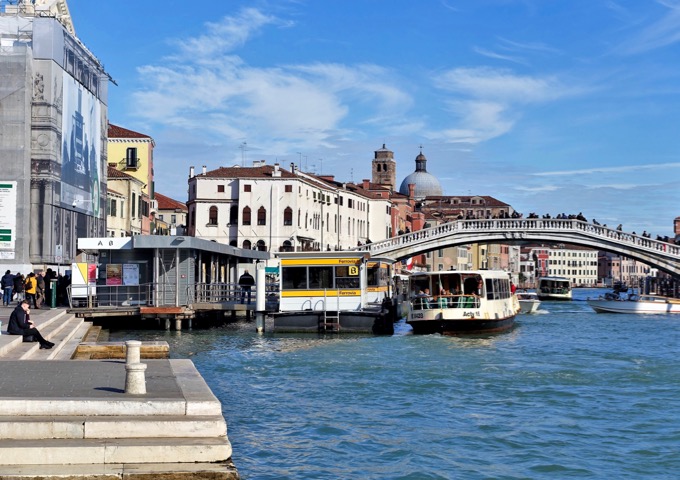
The vaporetto stop near the train station is called Ferrovia, and has five small docks, labelled A-E. Vaporetto routes 1-5, 12, and 13 all stop here. Most travelers will be arriving via routes 1 or 2, which stop at landing stages A, B, and E.
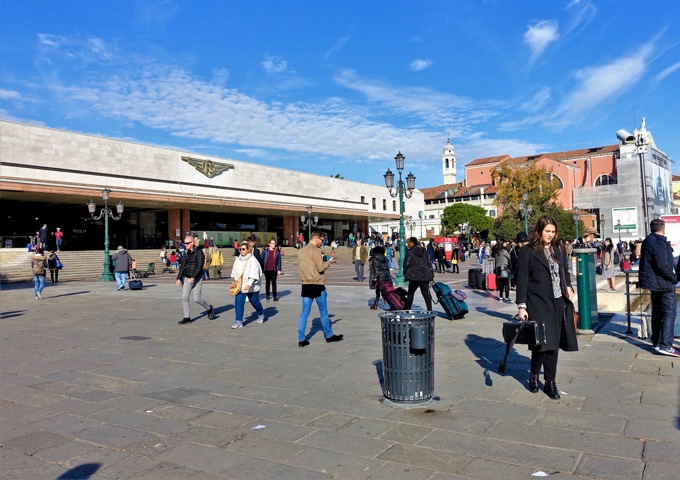
The main entrance to the station is up the set of stairs under and to the left of the large, winged FS sign on the front of the building.
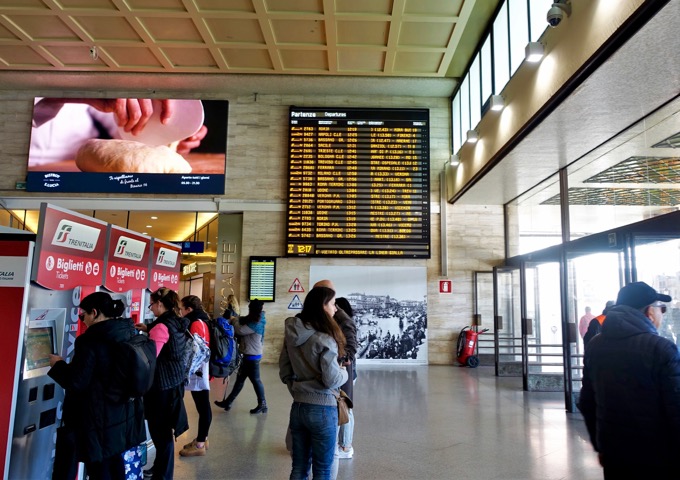
Entering the station through the row of glass doors, passengers will find self-service ticketing kiosks and a large electronic display listing the next several departing trains. A smaller screen to the lower left of the departures shows the most recent and upcoming arrivals.
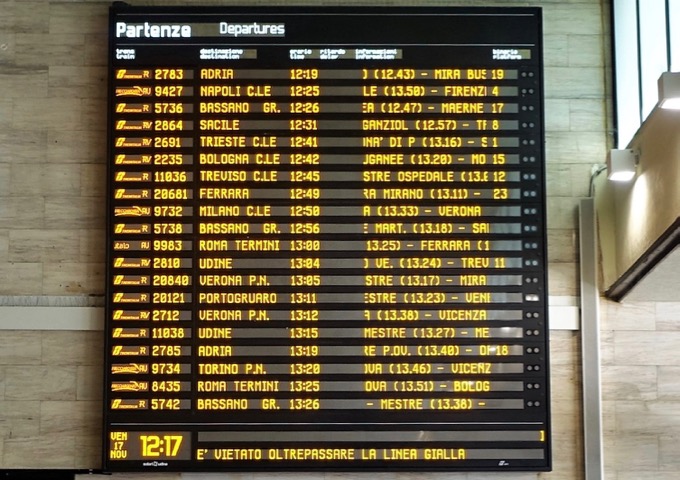
The departure screen display begins with the train number, its final destination, its scheduled departure time, a running list of stops along the way, and at the end, the platform number where the train leaves from. Notice that all departures are listed in military time, where 14:00 means 2:00 p.m. A train from Venice to Florence may end as far south as Naples and so be listed as a Naples-bound train. To find your platform using these signs, look for your train number.
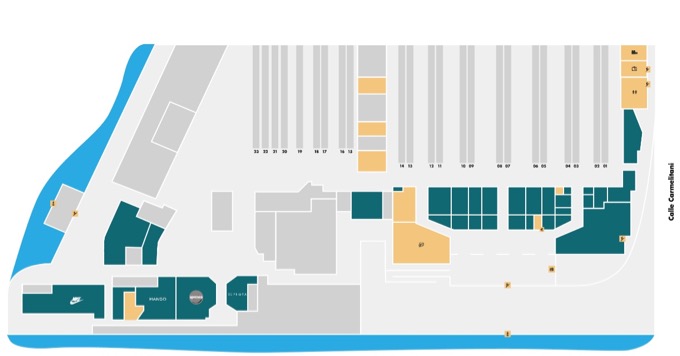
This is the official map of the train station. All platforms, services, restaurants, and shops are on one floor, though there is one café with a second story platform. Teal squares indicate shops and restaurants, while beige squares mark services, such as ticket offices, disability assistance, and restrooms. Platforms are indicated as vertical grey stripes, beginning with Platform 1 on the far right and ending with Platform 23 on the far left. There is an interactive version of this map on the station website.
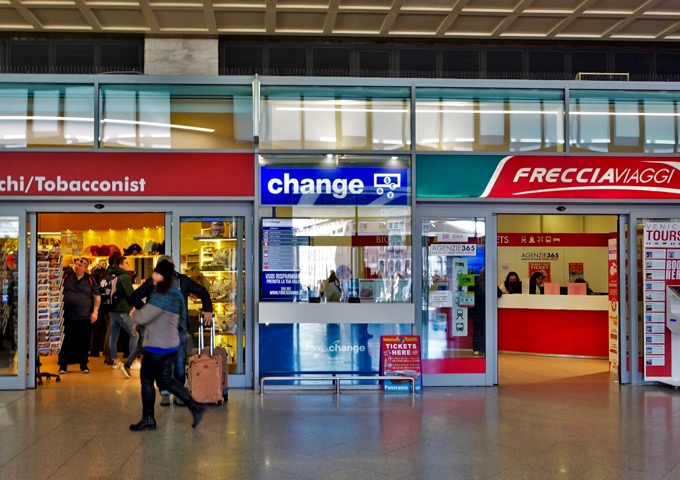
There is a currency exchange window behind the kiosks.
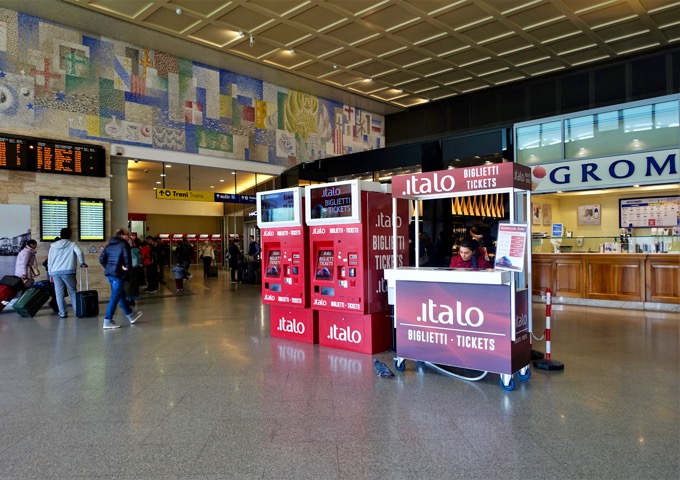
The view looking left shows the Italo ticketing kiosks and agents, Grom gelato shop, and exits toward the platforms, shops, and Sala Blu disability services.
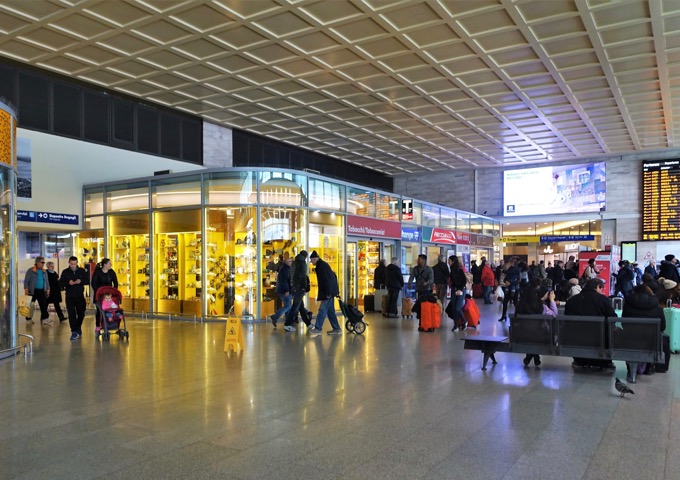
The view of the station lobby to the right with shops, currency exchange, Trenitalia ticketing, the departures board, and exits toward the platforms and the baggage drop.
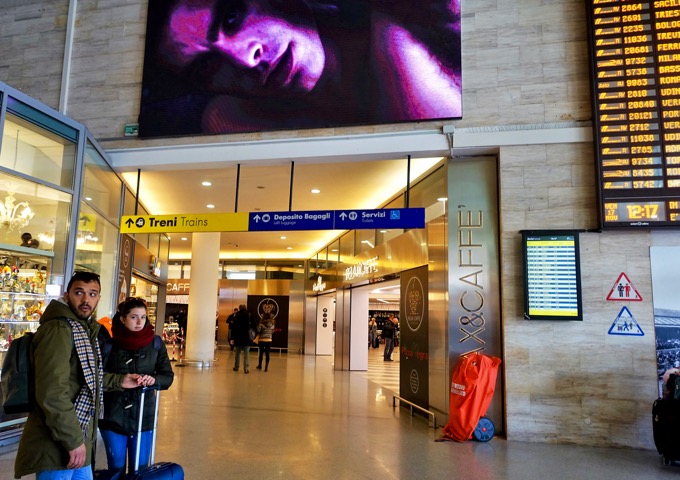
Heading straight past the shops and departure sign leads to the platforms and most of the services, restaurants, cafes, and shops.
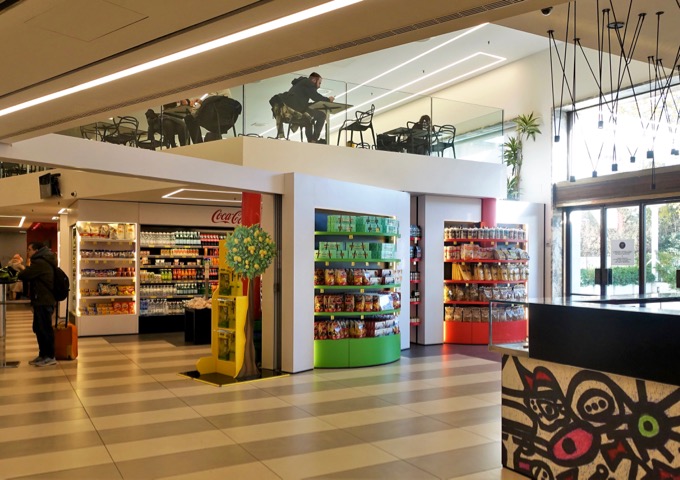
You’ll pass another entrance. Relax & Caffe, seen here above, is the only business on the Mezzanine Level.
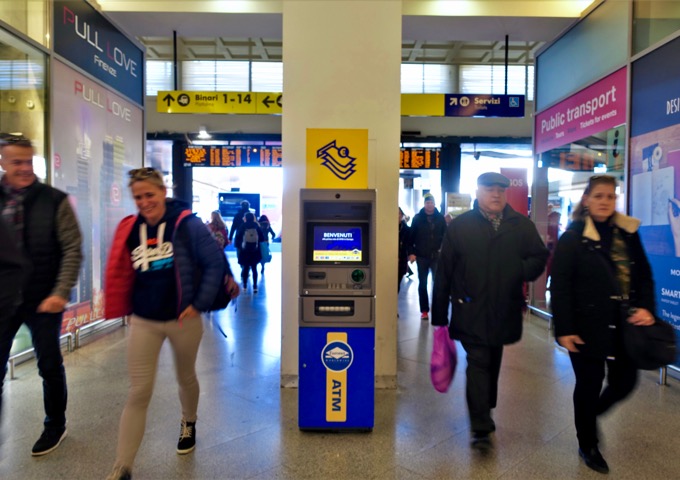
Following the hallway leads to this ATM, with Platforms 3 and 4 directly behind it. Platform 1 and 2 are on the right. Restrooms and luggage drop are on that side, adjacent to Platform 1. Platforms 5 to 23 are to the left. Sala Blu, the disability services office, is on this side, adjacent to Platform 14.
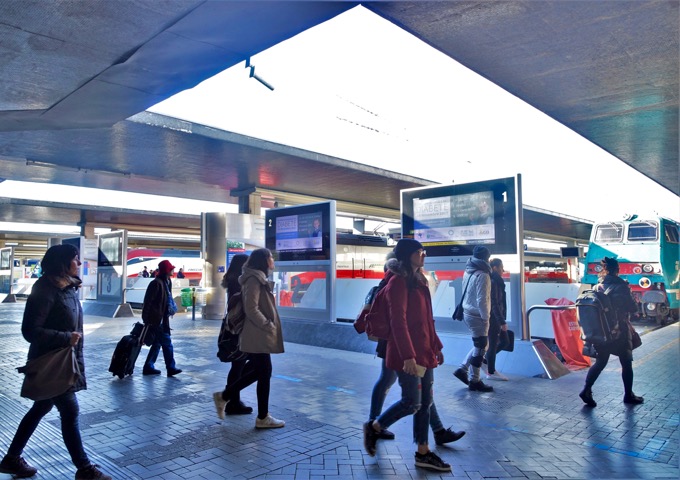
View from the corner at Platform 1.
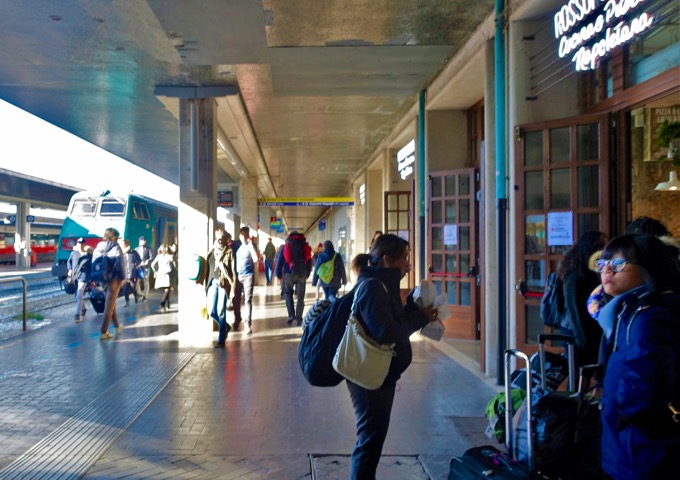
Walking alongside Platform 1, there are a few restaurants. Straight ahead are the restrooms and Ki Point left luggage/baggage drop.
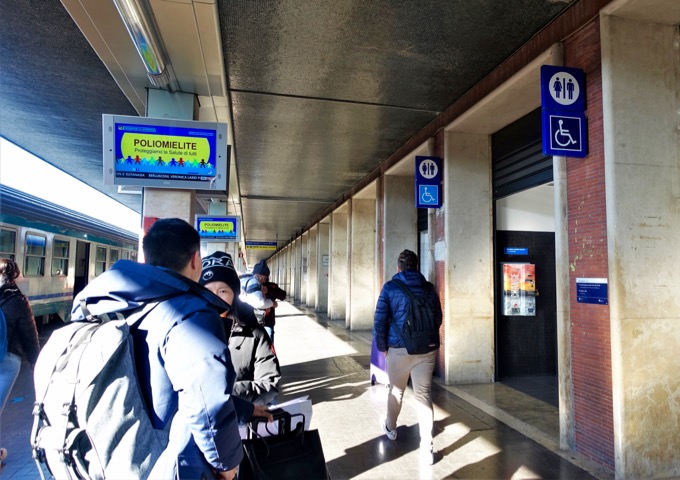
Restrooms signs next to Platform 1.
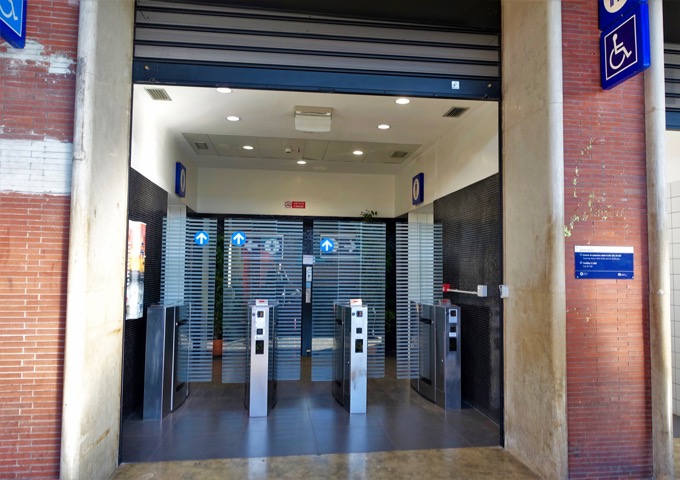
You’ll need to pay €1 to enter the restrooms. Payment is in coins only, and there is a change machine at the entry.
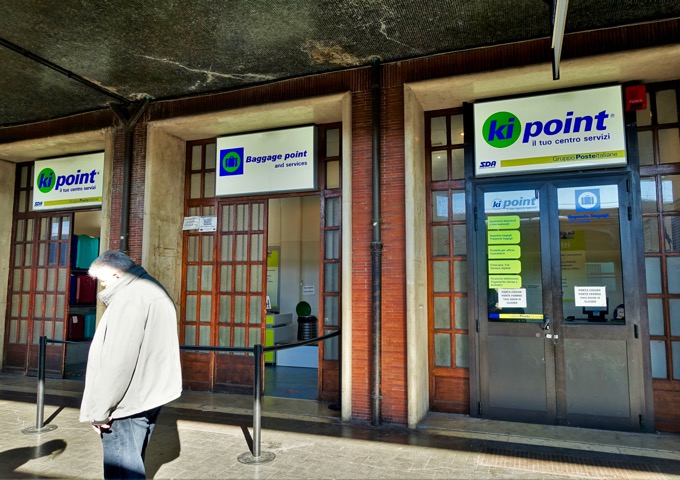
Left luggage is just past the restrooms.
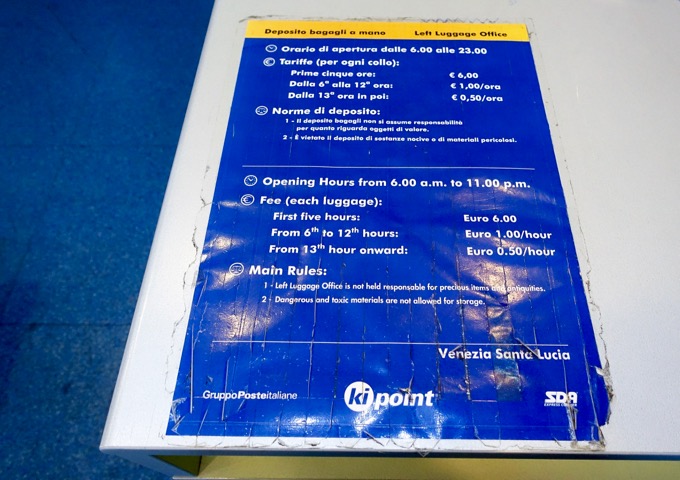
Luggage storage rates are posted inside the office, at €6 for the first five hours…
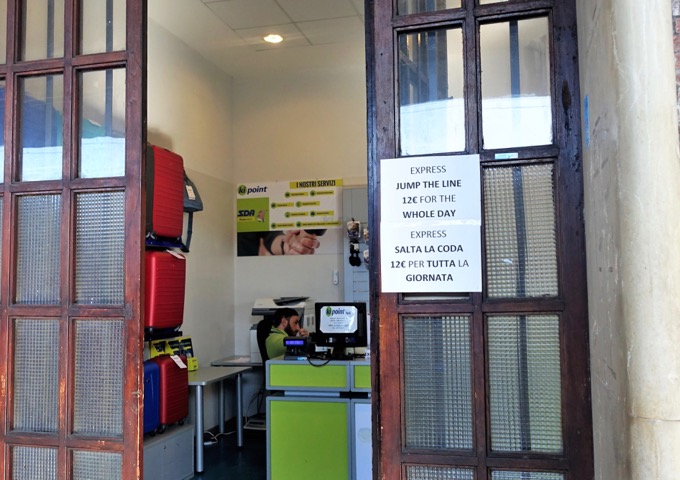
…Or cut the line for €12 for the whole day.
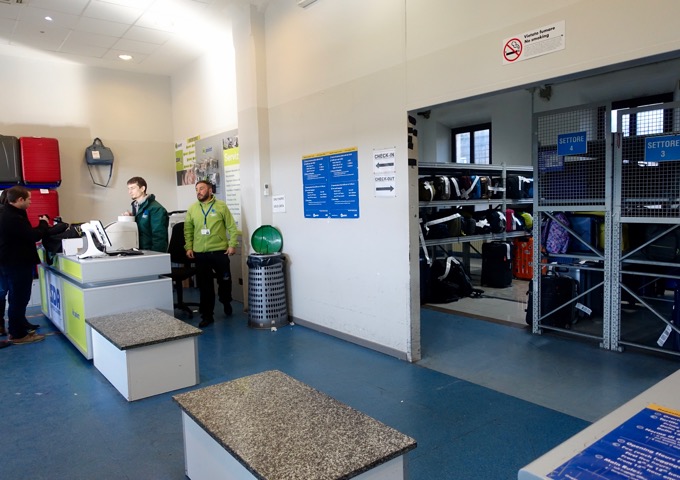
Inside the Ki Point baggage drop office.
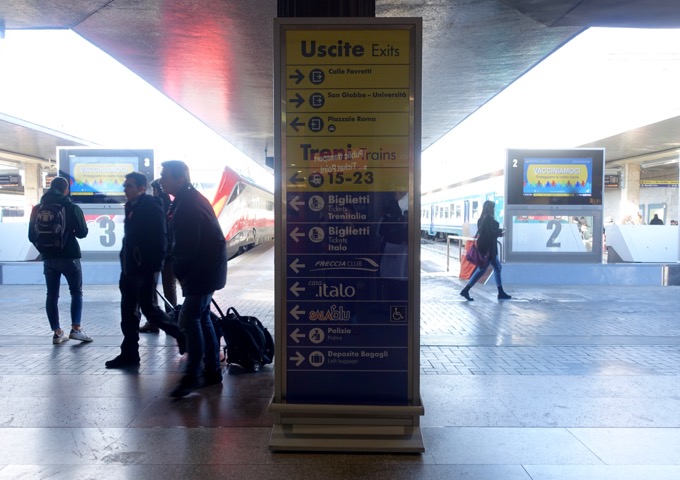
Returning to the landing in front of the platforms. Heading left leads to Sala Blu, the ticketing offices for Trenitalia and Italo, and the police station.
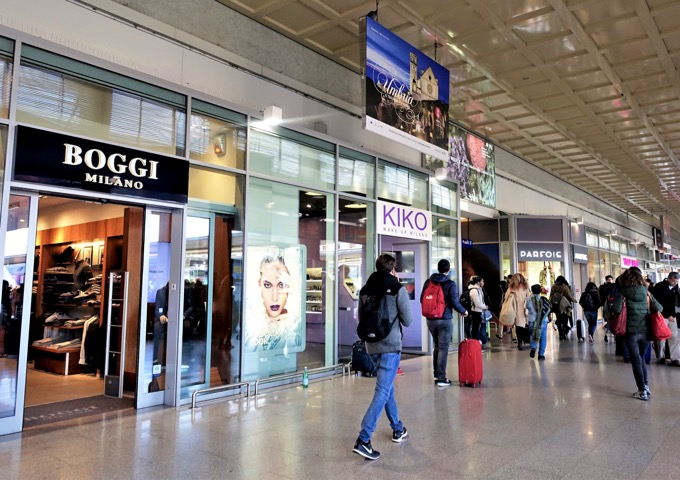
Shops along the way.

More self-service ticketing kiosks along the way. The green, white, and red machine in the middle is the ticket validating machine. Be on the lookout for these. You’ll need to validate your train ticket before boarding.
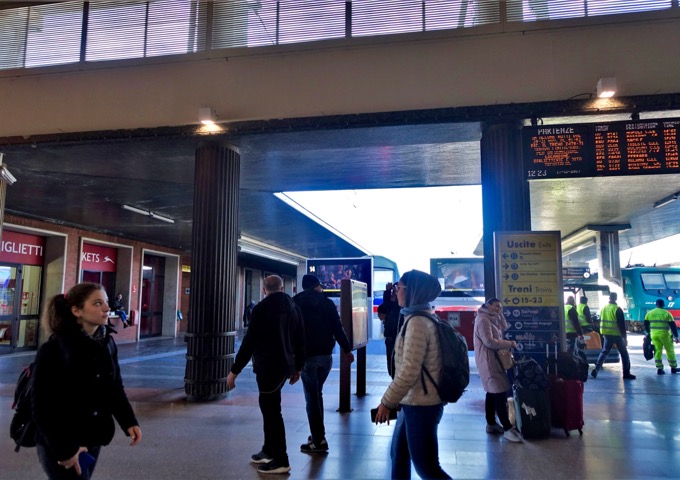
Facing Platform 14, there is an electronic display of upcoming departures in the upper right, and the Italo ticketing office to the left.
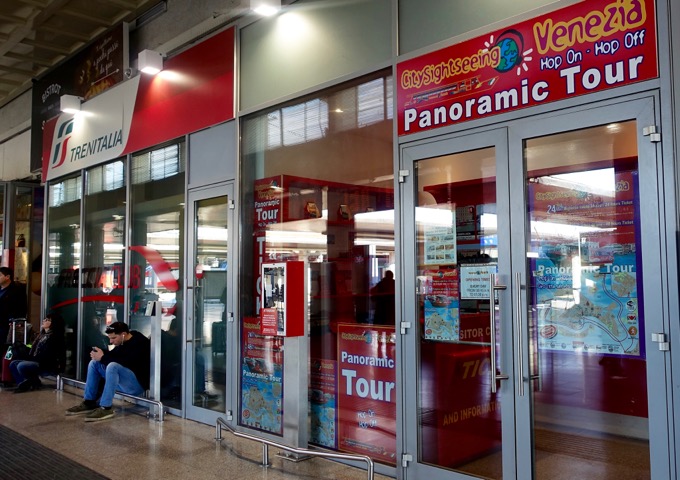
Turning directly behind, you’ll find the Trenitalia ticketing office and the Hop-On-Hop-Off Tour.
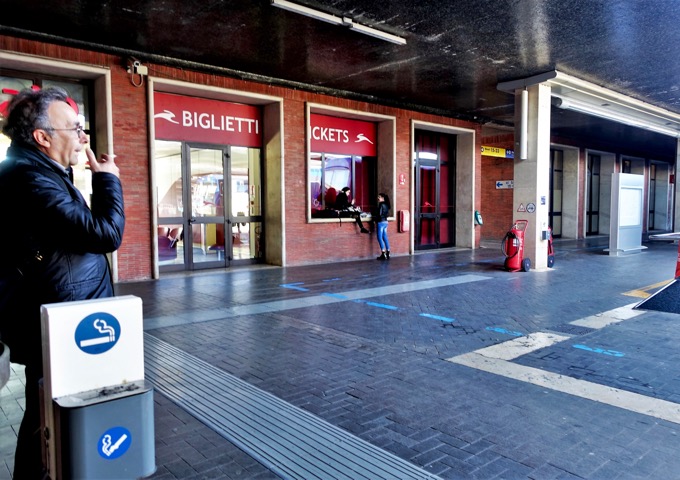
Platform 14 also has a small smoking section. To the right of the Italo ticketing office, there is a hallway leading to Platforms 15-23. In between the Italo office and the hallway, there notice another ticket validating machine.
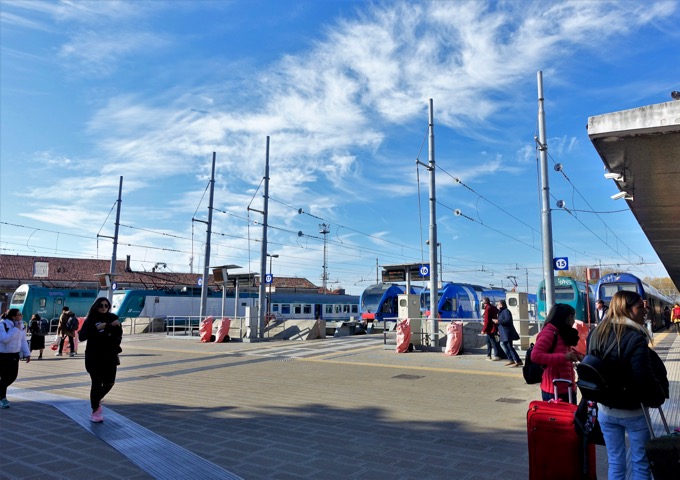
Platforms 15-23 are uncovered.
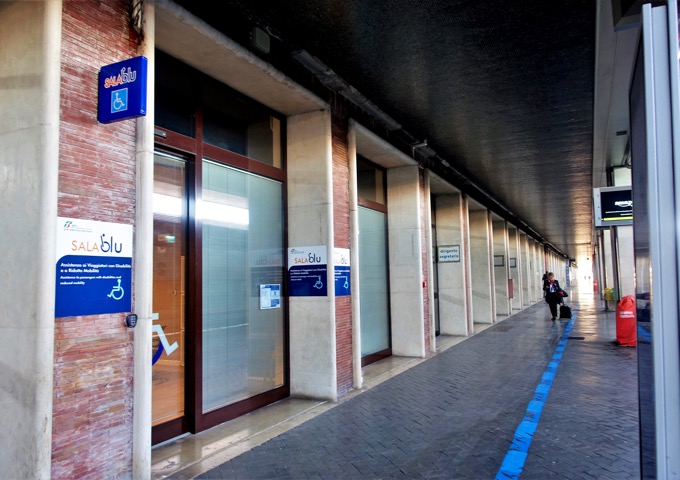
Alongside Platform 14, past the hallway to the outdoor platforms, is the Sala Blu office for accessibility assistance.
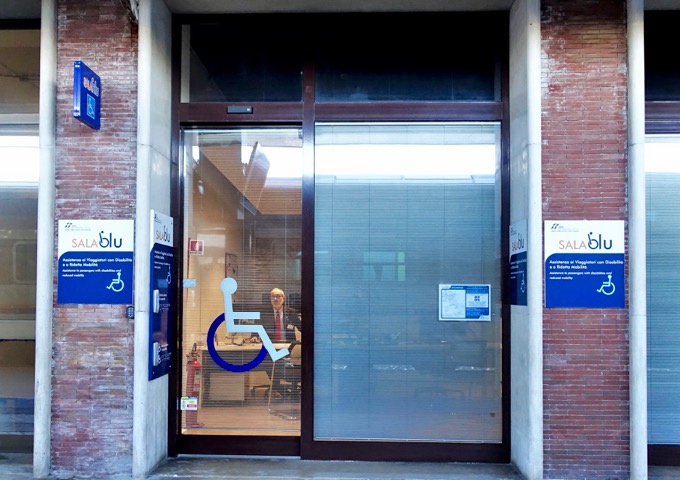
Entry to the Sala Blu office is through a sliding door. There are two bells on the wall to the left of the door.
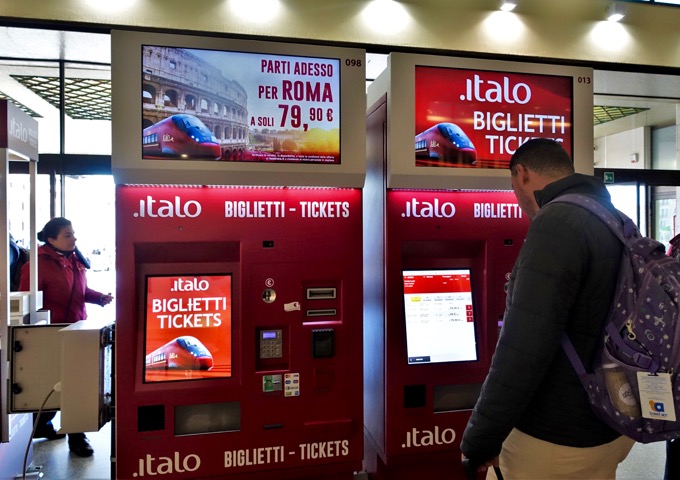
You can buy a ticket on the day of travel from one of the ticketing offices or a self-serve kiosk; this is a great option if you prefer a more flexible schedule, rather than being locked into a designated time. To save a few Euros, buy your tickets online through the Trenitalia or Italo website a day in advance; kids ride free if you buy two days in advance, and adult tickets are usually much cheaper if bought ahead of time.
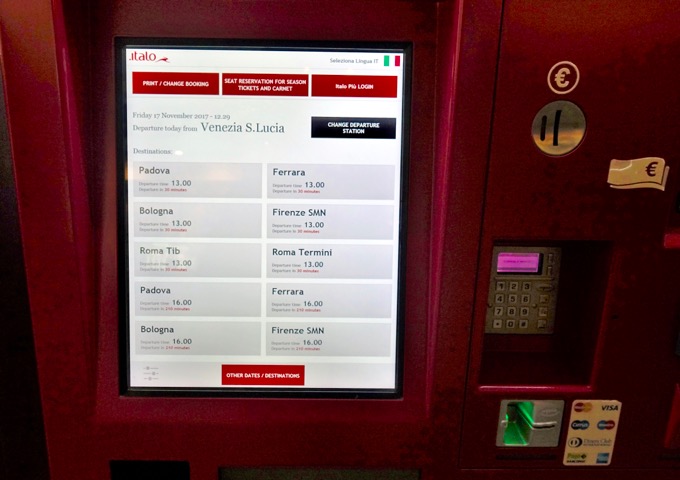
To buy at the touch screen kiosk, choose Firenze SMN as your destination.
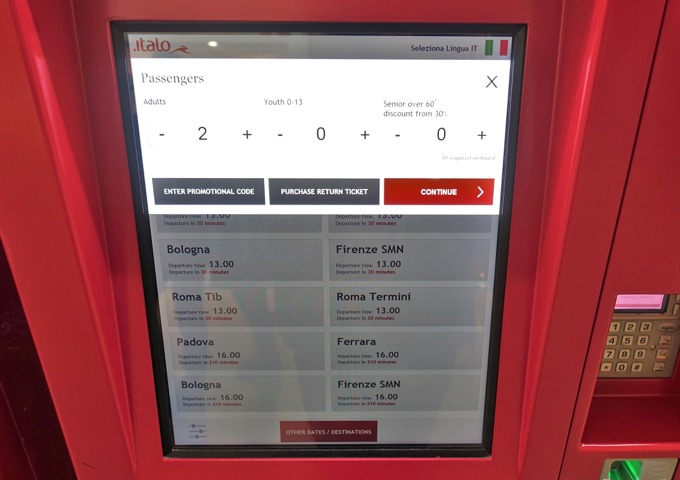
Choose the number of travelers from each age group.

Choose which train time to leave. Notice again that all times are listed using military format. The prices will be different depending on the popularity of that time frame; all of these listed here make the same stops and arrive within the same amount of time.

Select the ticket type, whether Smart, Comfort, Prima, or Club Executive. Smart is the basic ticket, with spacious, reclining seats with footrests, tables, individual power outlets, wifi, and access to the vending machines onboard. Comfort has bigger seats. Prima comes with welcome drinks and snacks that are served to each passenger. Club Exec includes access to the lounge at the station. Smart is the most popular option for short trips like this one.
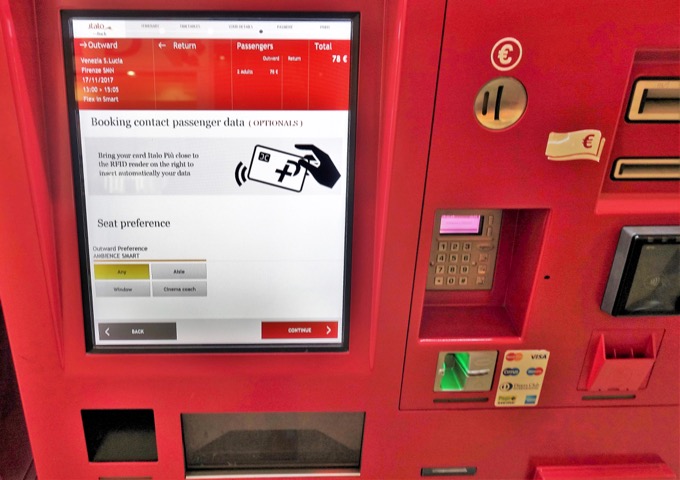
Choose your seat preference, hit continue, and pay. Payment can be made with a credit card (green lit slot), contactless card (the black square to the right of the keypad), Euro bills or coins (top right slots). Retrieve your ticket from behind the plastic window in the bottom rectangle area.
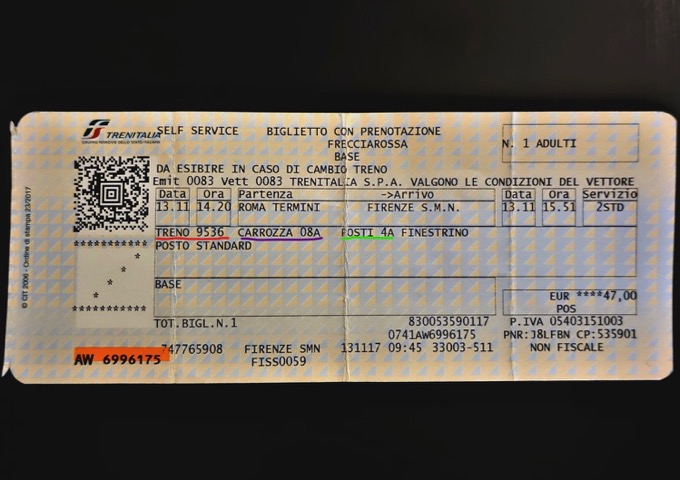
An example of a ticket, this one from Trenitalia. This is a Rome to Florence ticket, but looks the same as the Venice to Florence one. The train number is labeled “Treno” and
underlined in red; use this number to find your platform for boarding. Seats on all express trains, whether run by Italo or Trenitalia are assigned. The seat on this train is located in Carriage 8, labelled Carrozza 08 and underlined in purple. The seat number is 4A, labelled “Posti 4A.” This is a window seat, “Finestrino;” an aisle seat will be labelled “Corridoio.” Electronic tickets will include the same information.
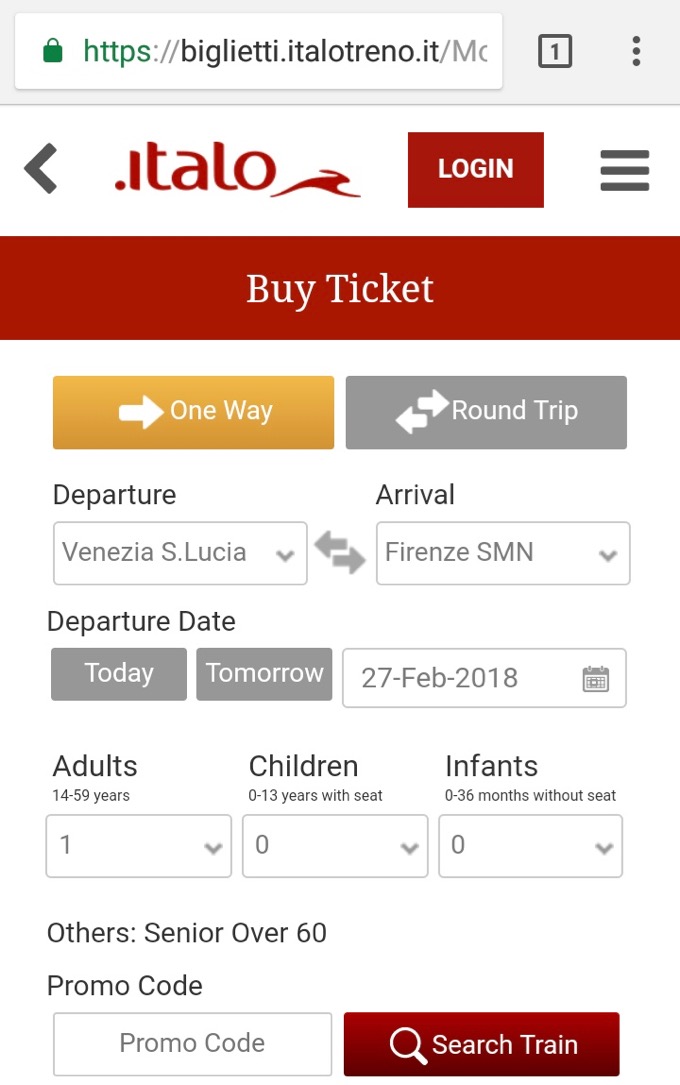
To buy your ticket online, visit Trenitalia or Italo’s ticketing site. I’m using Italo here at biglietti.italotreno.it, because they are usually cheaper, especially if purchased a few days in advance. Trenitalia’s trains are cost more, but offer luxuries such as a dining car. Choose a one-way or round trip ticket. Set Venezia S. Lucia as the departure and Firenze SMN as the arrival. Choose the date and the number of each type of traveler.
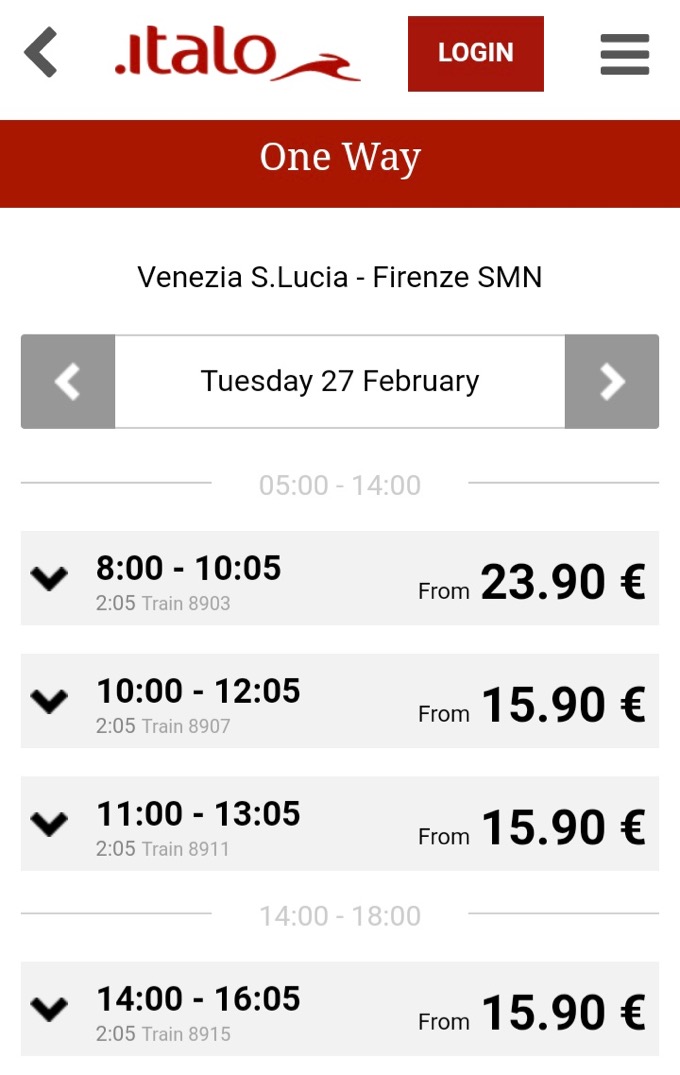
Choose the departure time. Notice that prices change depending on what time you select.
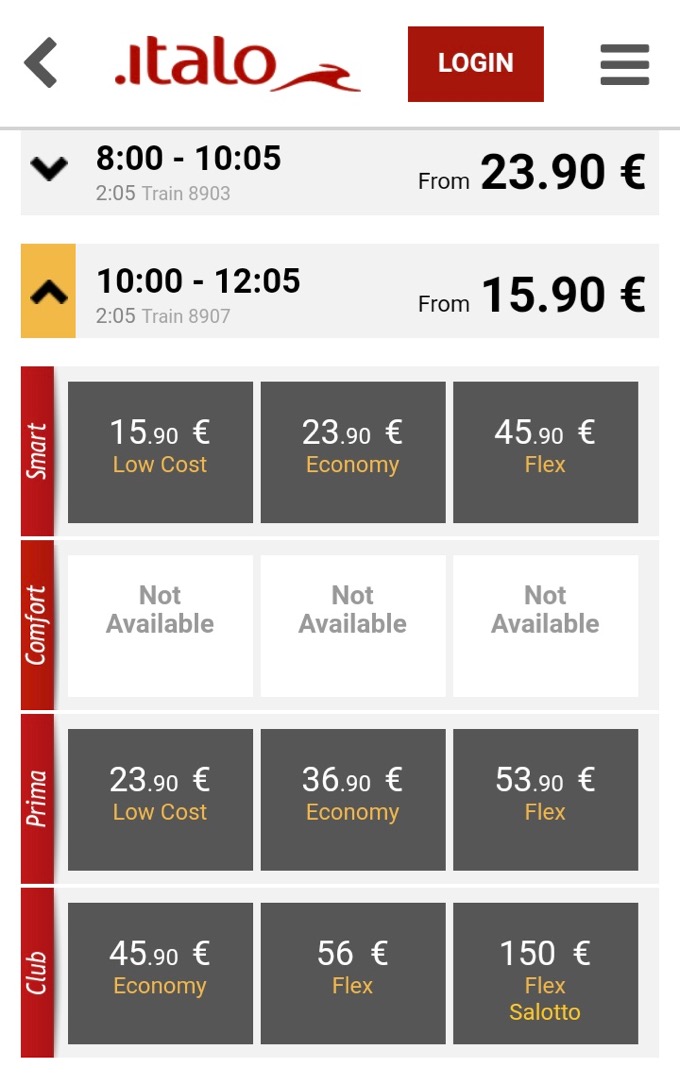
Choose which type of ticket you prefer. For short rides, it’s not worth the extra for an upgraded seat.
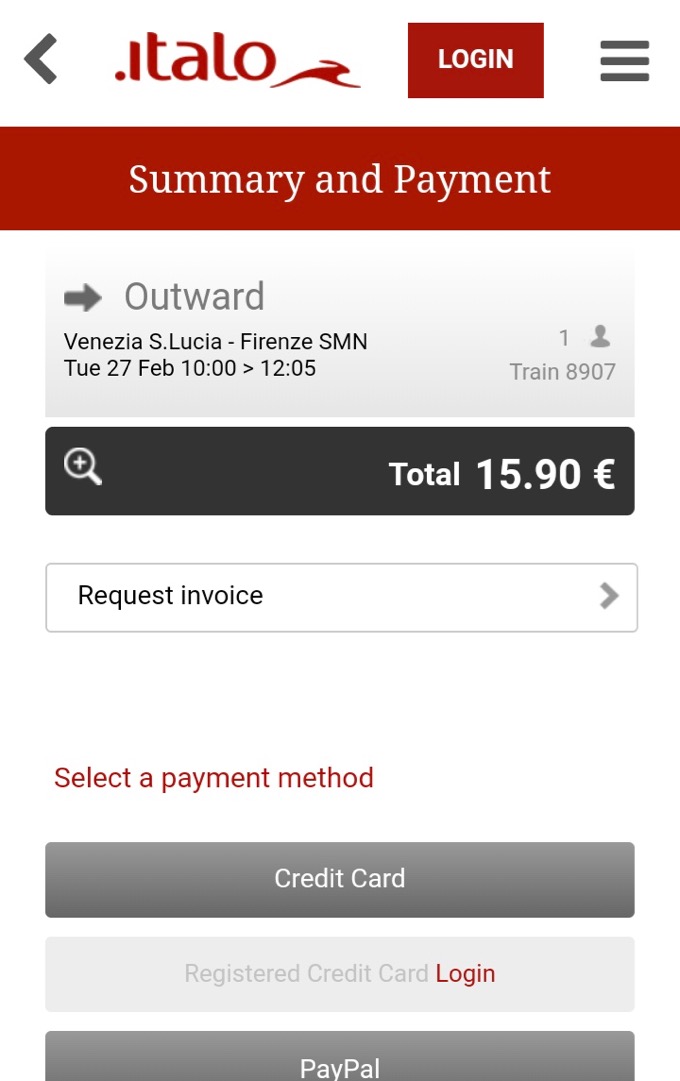
Confirm that the details are correct, then choose your payment method.
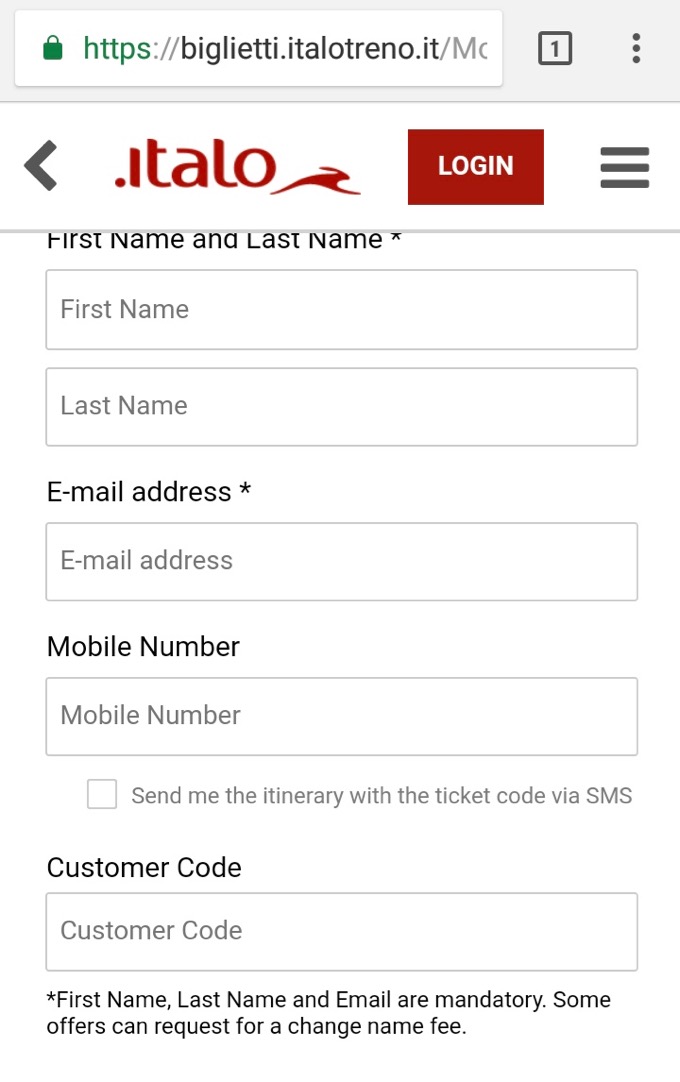
Enter your information to receive your ticket via text or email.
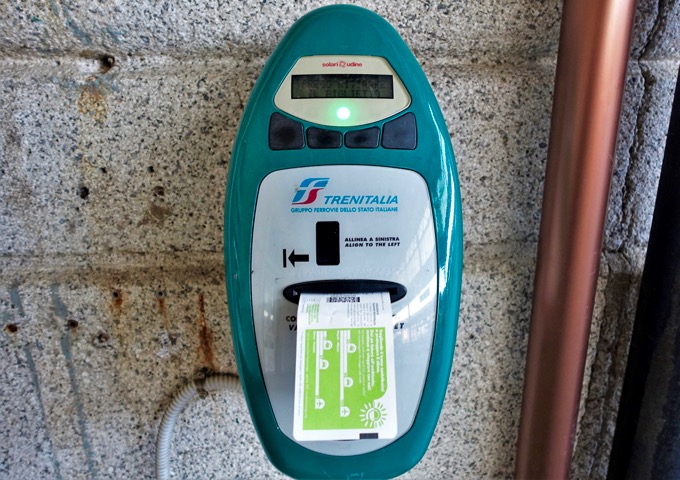
Once you have your ticket and a few minutes before the scheduled departure, head to the platforms. If you have a paper ticket, validate it in the machine before boarding the train. To do so, insert it face down and align it to the left in the slot to be stamped. For electronic tickets, pull up the ticket on your phone screen and keep it handy onboard for the ticket officer to check.
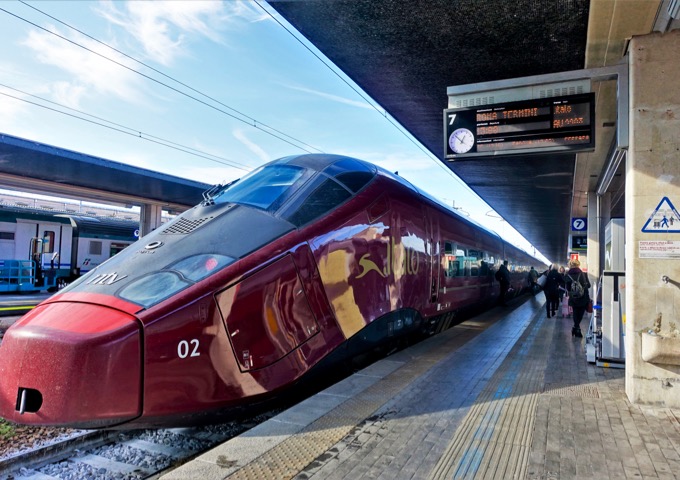
Look for your train number on your ticket, and use the electronic displays to find the correct platform. In many cases the train’s destination is not the same as your own destination, so checking the train number is the best way to find the correct platform. In this case, the Rome-bound train will stop at Firenze SMN.
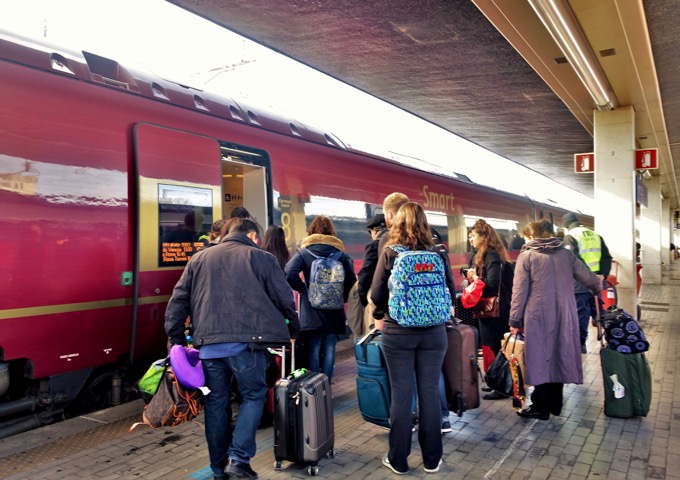
Board at the correct carriage, as indicated on your ticket. This is Carriage 8, as shown in the black sign on the side of the train with a gold number 8.
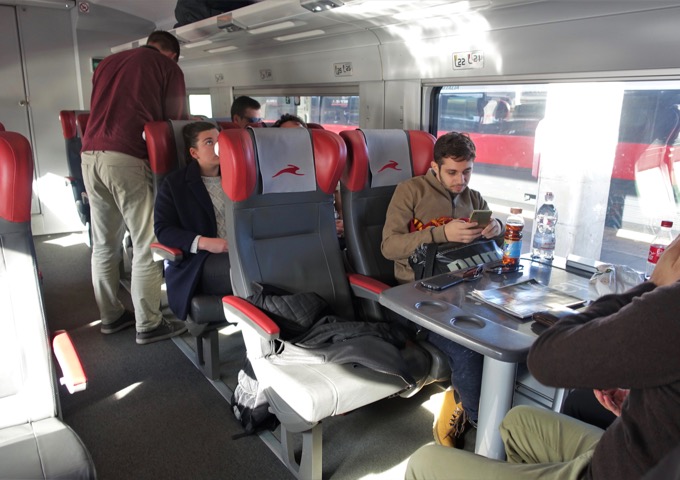
Find your seat. Seats numbers are shown above the windows. Groups of four face each other and share a table.
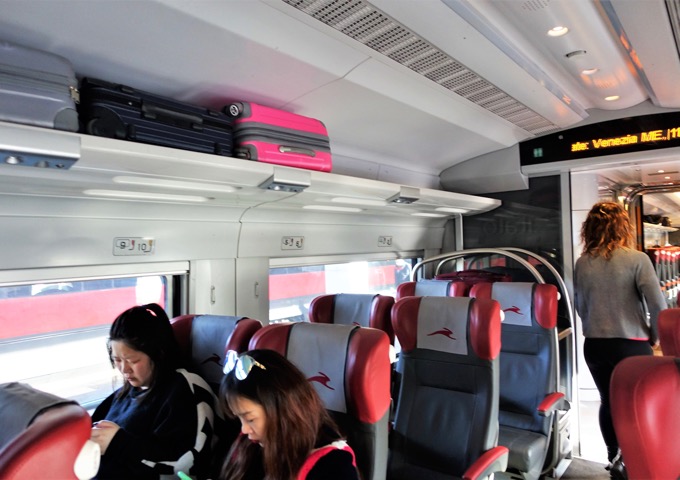
Groups of two sit side by side, and have tray tables that fold out. There is space for carry-on sized luggage above the seats, just like on an airplane. Behind the back seat is a steel luggage rack.
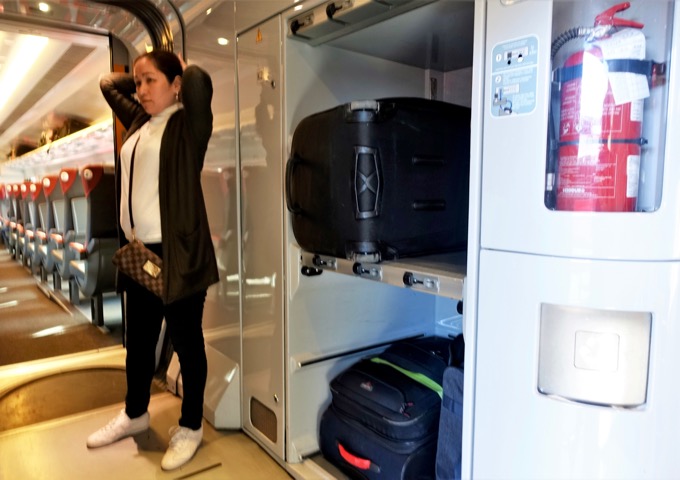
There is additional luggage storage in the hallway between carriages, across from the restrooms.
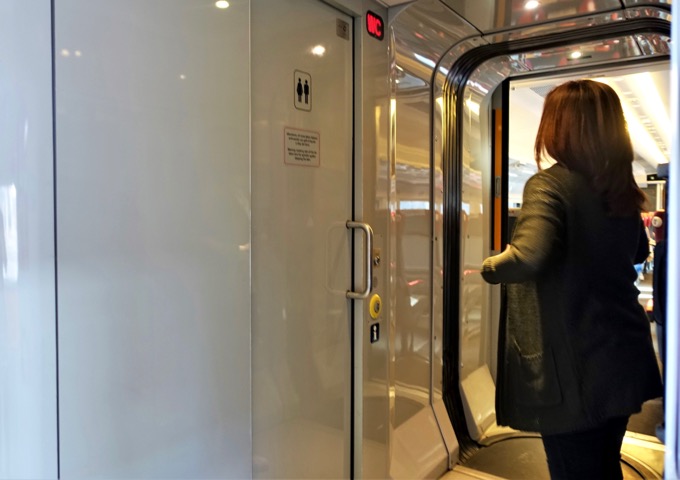
Restrooms across from the luggage storage.
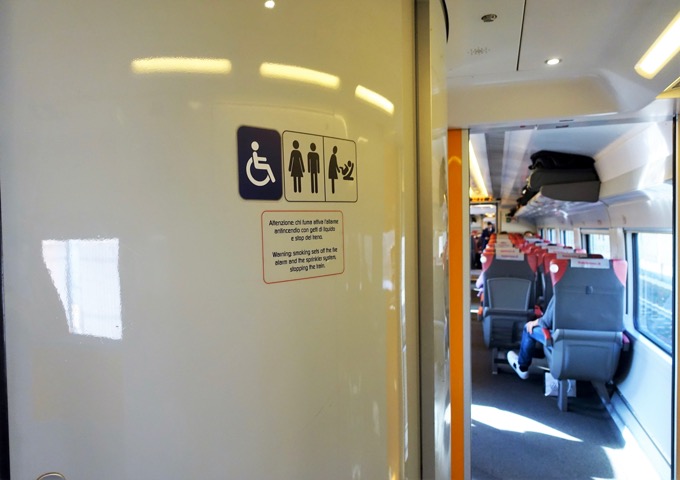
There are also a couple of larger, accessible restrooms on board.
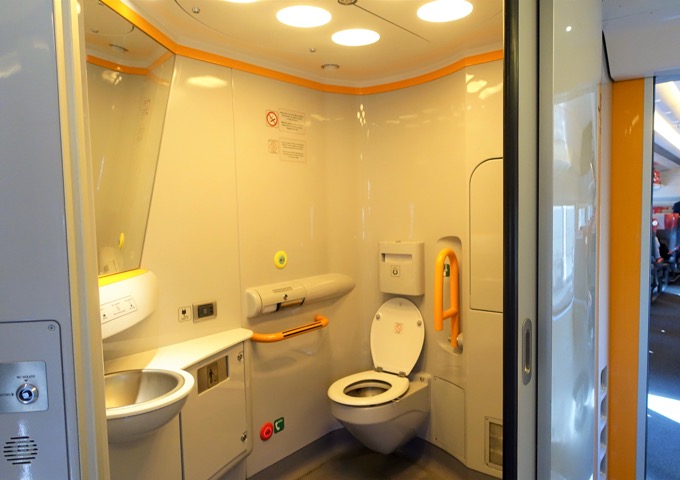
Accessible restrooms have more space, wall-mounted rails, plus a baby changing station.
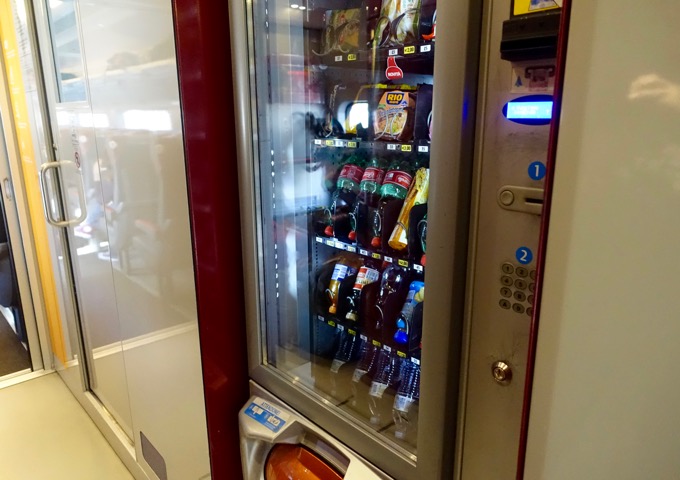
One car has vending machines with a variety of cold drinks and snacks.
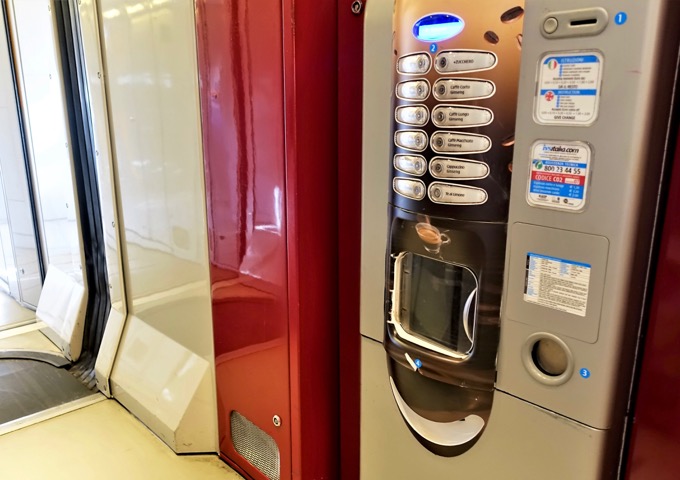
Espresso and tea are also available in this carriage.
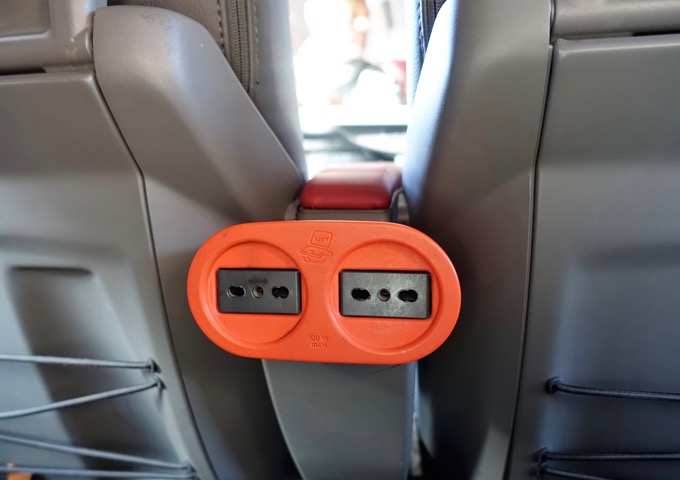
Relax on the ride. All trains have in-seat power outlets, as shown here.
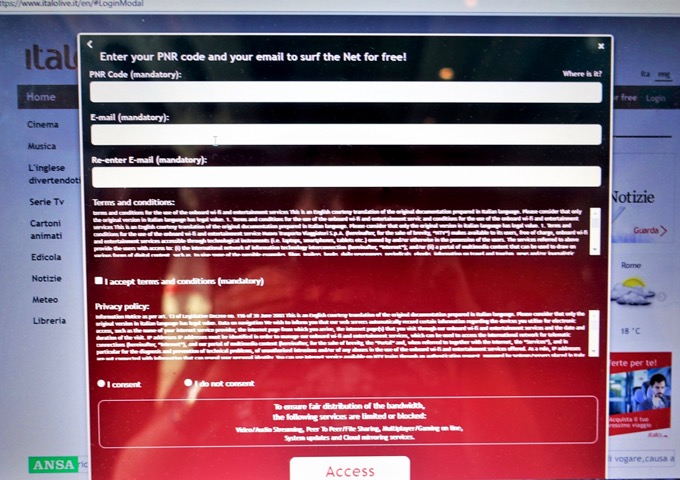
And free wifi.
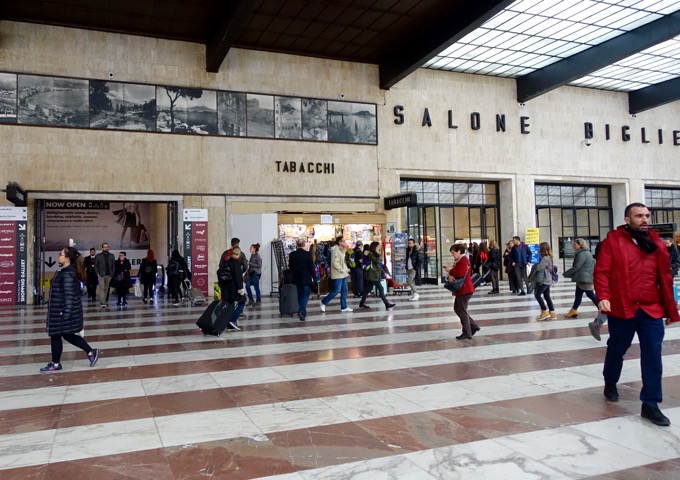
Arrive in Florence. There are several restaurants and shops inside Santa Maria Novella Station, along with an underground mini mall. Facing the shops, the main exits will be on the left past Platform 16, or ahead through the ticket office marked “Salone Biglietteria” – seen here to the right of the tobacco shop.
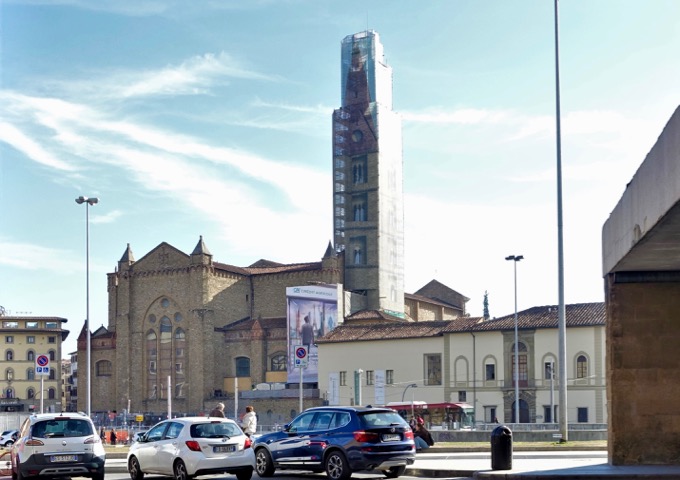
View of Santa Maria Novella Church directly across from the train station. You can catch a taxi right here or walk to most hotels in Florence’s City Center (Duomo), San Marco, and San Lorenzo neighborhoods.
About Santorini Dave